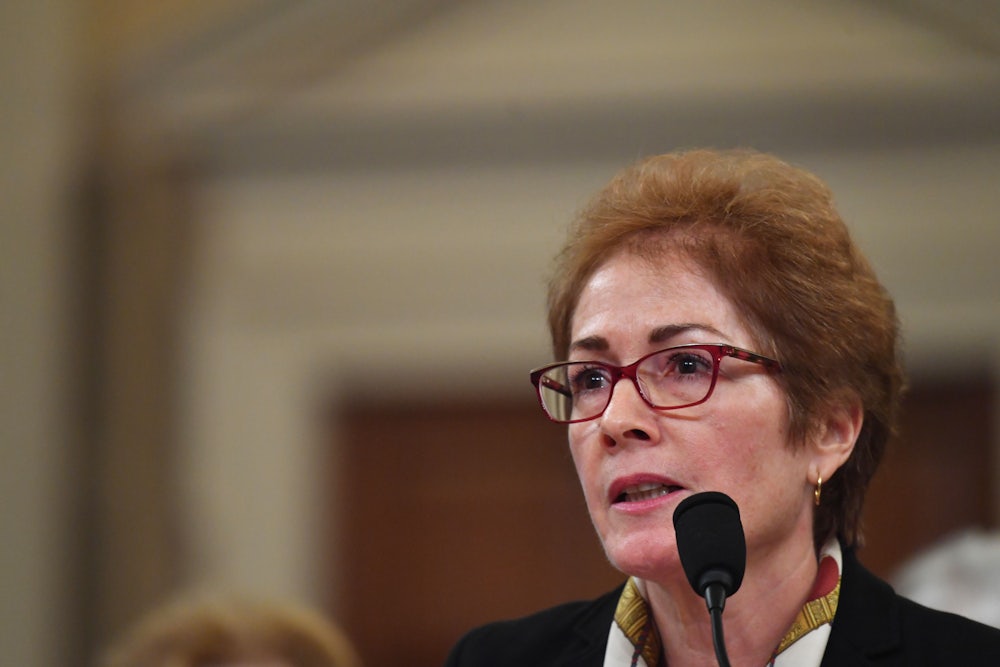The impeachment hearings got their first made-for-TV moment during ousted Ambassador to Ukraine Marie Yovanovitch’s testimony, thanks to a cameo from President Trump. Early in Yovanovitch’s testimony, the president lashed out in a tweet denigrating her service in Somalia and Ukraine. This was an opening for House Intelligence Chair Adam Schiff, who asked for her response. “It’s very intimidating,” Yovanovitch said. “I mean, I can’t speak to what the president is trying to do, but I think the effect is trying to be intimidating.”
Schiff readily agreed, referring to the tweet as witness intimidation. We seemed to witness, in real time on national television, a new article of impeachment being written. It was immediately treated as an “extraordinary” moment. Even Fox News couldn’t ignore its significance.
Bret Baier: "This whole hearing turned on a dime when Trump tweeted about her real time ... that enabled Schiff to then characterize that tweet as intimidating the witness or tampering with the witness, which is a crime. Adding essentially an article of impeachment real time." pic.twitter.com/OGZ0BPPOtD
— Lis Power (@LisPower1) November 15, 2019
Here was what the media had been waiting for, after many dismissed the first day of testimony on Wednesday as a high-profile flop, if not quite a Spiderman: Turn Off the Dark–level debacle. Two Reuters reporters dismissed it as “consequential, but dull,” adding that “unlike the best reality TV shows—not to mention the Trump presidency itself—fireworks and explosive moments were scarce.” NBC bemoaned the lack of “pizzaz” (a word that should be forcibly excised from the English language), with Jonathan Allen claiming that the hearings “felt more like the dress rehearsal for a serious one-act play than the opening night of a hit Broadway musical.”
After day one, the verdict was clear: The Democrat’s big impeachment show was a boring bust. Day two, in contrast, is already being spun as a blockbuster.
But in terms of substance, there were few differences between the first and second day of hearings. Daniel Goldman, the attorney who has led much of the questioning for the Democrats, has built a strong case against the president, brick-by-brick. The witnesses have easily dismantled every cock-eyed narrative put forth by the president and his defenders about his involvement in the Ukraine scandal. That all this is happening during an impeachment hearing is extraordinary in and of itself, a moment of undeniable high drama. The idea that any of this is boring reveals how media has changed in the past few years: It has become addicted to Donald Trump.
Theater criticism in political media is nothing new, of course. “While these events aren’t mere entertainment, they are attempts to affect public opinion, and they’re staged (the word choice is deliberate, and accurate) to generate maximum effect,” Bloomberg’s Jonathan Bernstein wrote about the media response to day one of impeachment. “How politicians go about that job, whether they’re any good at it, and what they’re really trying to achieve is important to know.” Given the importance of public opinion on impeachment—it ultimately decided Richard Nixon’s fate in 1974 and saved Bill Clinton in 1998—gauging the public’s potential reaction has some value.
Theater criticism can even be newsworthy. A report on Axios in advance of Friday’s second day of testimony dinged Democrats for failing to win the battle for the public’s attention. “New data about Wednesday’s hearing shows the difficulty in capturing the attention of a nation that’s developed a higher tolerance for permanent political drama under the current president,” wrote Neal Rothschild and Sara Fischer, noting that day one’s ratings paled in comparison to those for high-profile appearances from Robert Mueller, Brett Kavanaugh, and James Comey. Unlike these one-off events, impeachment is a marathon, which may have driven down interest. Furthermore, none of those testifying are household names. Axios also contended that the “pre-determined” nature of the proceedings, in which the essential facts have been reported beforehand, meant that there was little drama (it’s worth noting, however, that William Taylor, the acting U.S. ambassador to Ukraine, did break some news in his testimony).
There’s an assumption in many of these reports that substance is useless without spectacle. The tension between an upright civil service and a president intent on abusing his office for personal gain is inherently dramatic—it is the kind of conflict one would expect in an Aaron Sorkin show. The emphasis on theater shows that the media has come to privilege the aesthetics of fictional politics—shouting, ornate monologues, clear-cut victories—over reality, however significant actual events may be. There is, similarly, an assumption that the public is as jaundiced as the media, that viewers are hooked on the manic highs of the president’s tweets and are unmoved before Goldman’s patient excavation of his crimes.
Spectacle, it seems, equals Trump. No political event is exciting or worthy of your attention until he inserts himself into it, preferably in real time. The Democrats’ sober approach to impeachment can never compete with the never-ending pro-wrestling match that follows the president wherever he goes. For all of the ardent protests on cable news and the Sunday shows about Trump’s debasement of the office, journalists now judge historical events based on a scorecard he has devised.
